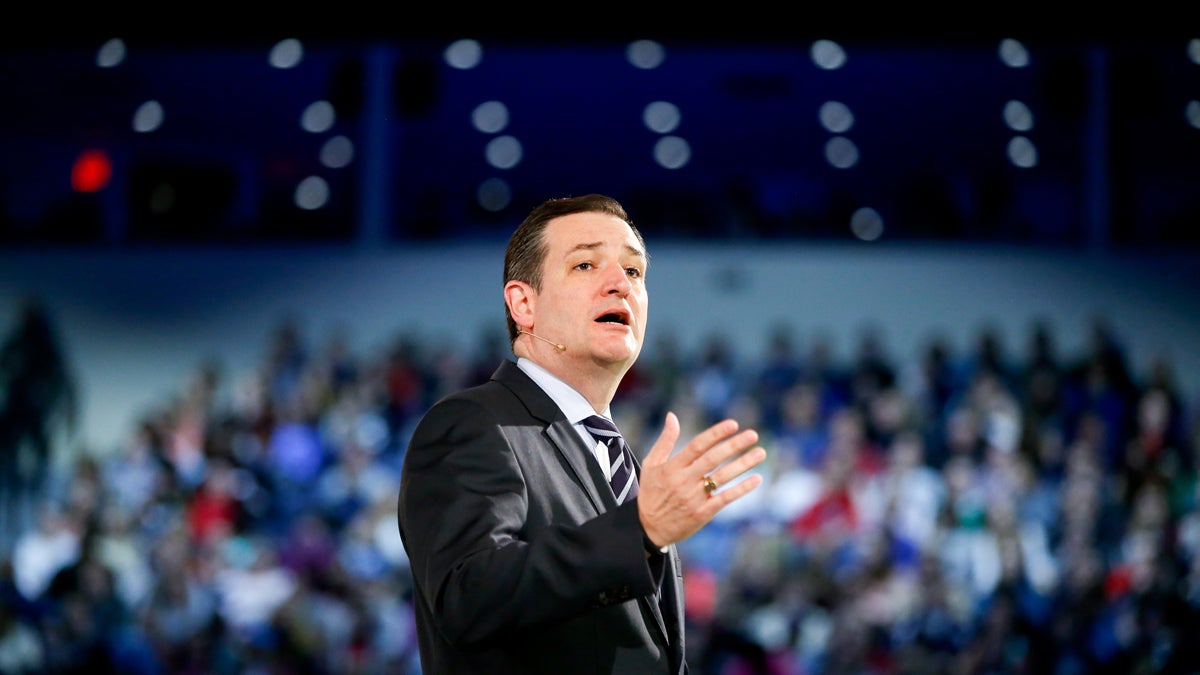Is Ted Cruz a ‘natural born citizen’? I don’t care, and neither should you

Sen. Ted Cruz, R-Texas, is shown speaking at Liberty University in 2015 shortly after announcing his candidacy for president. (AP Photo/Andrew Harnik, file)
Why do you have to be “natural born” — however we define that term — in order to be president? As we proudly remind the world, we’re a country of immigrants. So why can’t an immigrant be the country’s leader?
Thanks to Donald Trump, we have a new birther debate!
I’m not talking about President Obama, who had to produce his Hawaii birth certificate a few years ago in response to suggestions by Trump and others that he was born outside the United States.
I’m talking about Ted Cruz, who really was born outside of the United States. And to Trump, that means Cruz might not be eligible to be president.
Trump raised the issue again at the Republican presidential debate on Jan. 14 amid a feisty exchange with Cruz, who was born in Canada to an American mother and a Cuban father. That same day, a Houston lawyer filed a federal lawsuit asking a judge to clarify whether Cruz can serve in our highest office.
The question turns on the Constitutional requirement that you must be a “natural born citizen” to be our president. To Cruz’s defenders, that means you have to be born to at least one American parent. Others say you have to be born right here, in the good old USA.
But I have a different question, for all of us: Why should it matter?
Why do you have to be “natural born” — however we define that term — in order to be president? As we proudly remind the world, we’re a country of immigrants. So why can’t an immigrant be the country’s leader?
For the Founding Fathers, the answer lay in national security. If foreign-born Americans could become president, foreign powers might use them to undermine the new republic. Just 15 years before our Constitution was drafted, three countries — Austria, Prussia and Russia — conspired to elect a puppet king in Poland. Shortly after that, the three powers partitioned Poland among themselves. Unless we barred foreign-born candidates from our presidency, warned one delegate to our Constitutional Convention, “the fate of Poland may be that of united America.”
In 1787, these fears made sense — so much so, in fact, that the rules of presidential eligibility were adopted without a single dissenting voice. But we live in a very different time, when the rules make no sense at all. Our round-the-clock media scrutiny would quickly expose any foreign-born candidate who was serving as a foreign agent. Indeed, a hostile country wishing to infiltrate the White House would be much wiser to work through a native-born politician, who would naturally draw less attention than a foreign-born one.
Unlike the framers of the Constitution, moreover, we live in a multicultural democracy. They could not imagine someone like Barack Obama becoming president, because they restricted the full rights of citizenship to white males.
But today, we tell a very different story about ourselves. We are a nation of diverse peoples, bound together not by race or religion but by a shared set of civic principles: individual liberty, elected government, and equality under the law. But our rules on presidential eligibility suggest exactly the opposite. Some Americans — the ones who were born here — are more equal than others.
That’s why Sen. Orrin Hatch (R-Utah) proposed a bill back in 2003 that would allow anyone who has been a U.S. citizen for 20 years to run for president. Skeptics dubbed it the “Arnold Amendment,” suspecting that Hatch was simply clearing the way for the Austrian-born Arnold Schwarzenegger — who was serving as California’s governor — to run for the White House down the road.
Whatever his political motives, Hatch was correct on principle. Anyone who is a U.S. citizen should be able to become its chief executive. Naturalized citizens possess every other right and duty in our country: They vote, pay taxes, serve on juries, fight in the armed forces. And they’re eligible for every other elected and appointed office, too. Two of our most prominent secretaries of state, Henry Kissinger and Madeleine Albright, were born abroad; so were several other governors, including Michigan’s Jennifer Granholm and Vermont’s Madeleine Kunin.
Significantly, the Constitution’s ban on foreign-born presidents contained a large exception: If you had already immigrated to America in 1787, you could still seek its highest office. That allowed the foreign-born members of the Constitutional Convention — including Alexander Hamilton and Robert Morris — to retain the dream of becoming our chief executive.
Why deny that dream to immigrants today?
I don’t care for Ted Cruz, but he should have the same right to seek our presidency as anyone else. Is he a “natural born citizen”? I don’t know, and I don’t care. And neither should you.
WHYY is your source for fact-based, in-depth journalism and information. As a nonprofit organization, we rely on financial support from readers like you. Please give today.

